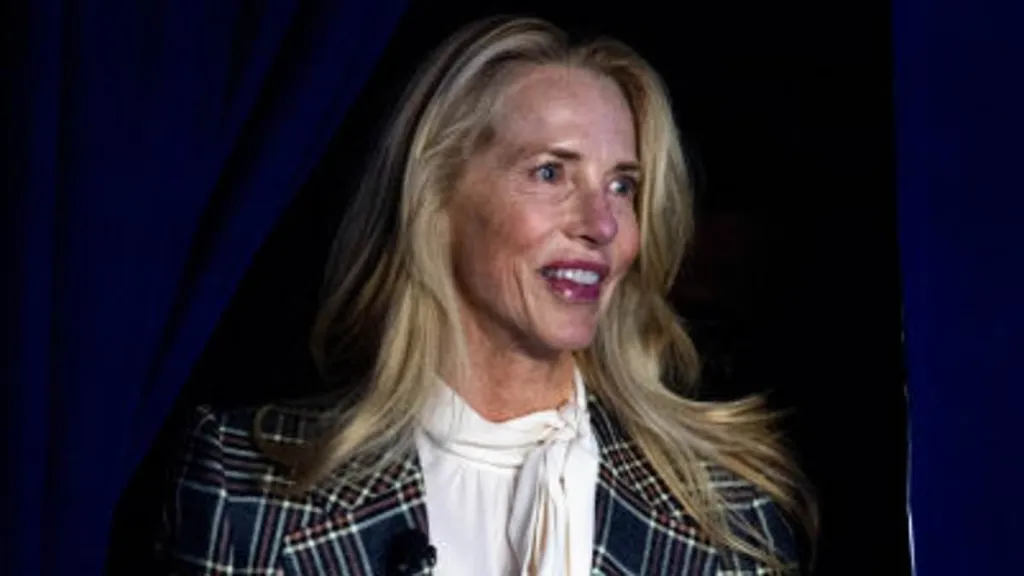Laurene Powell Jobs has outlined a bold outlook for humanity's future amid groundbreaking technological innovation in her annual letter from her philanthropy organization the Emerson Collective.
In the piece, written as an end-of-year sign off, it's clear she shares some of her late husband's vision as she paints a picture of progress shaped by human ingenuity and relentless creativity.
Top of the list is Artificial Intelligence (AI) which together with all its tradeoffs also requires a huge amount of power.
But Powell Jobs believes she has pinpointed those who are pioneers in tech who may play a role in navigating the journey.
'Our ability to recognize connections is being revolutionized by technologies like artificial intelligence, which are poised to shape the next era of human history,' she wrote.
'These forces will transform industries, societies, and daily life in profound ways -- but to harness their benefits, we must also find new, sustainable methods for powering our world.'
Powell Jobs highlighted the rapidly growing energy demands associated with artificial intelligence, emphasizing that current infrastructure may struggle to keep up.
Data centers essential for AI training already consume massive amounts of electricity, with experts predicting the demand will more than double by 2030, potentially accounting for nearly 10 percent of the total amount of electricity used in the U.S.
Laurene Powell Jobs, the founder and president of the Emerson Collective, appears to share some of her late husband's vision for the future in her year-end letter.
Laurene Powell Jobs pictured alongside her late husband and Apple co-founder Steve Jobs. The couple married in 1991. Jobs died from pancreatic cancer in 2011, at the age of 56.
'As national and global economies fuel an explosive demand for abundant, affordable, and clean energy, it is essential to expand beyond the current options for electricity generation,' she stressed.
Without sustainable power solutions, the transformative potential of AI could be hindered by energy shortages, threatening progress in various industries.
Powell Jobs pointed to innovators like Bob Mumgaard of Commonwealth Fusion Systems, whose quest for scalable fusion energy could solve such a looming crisis.
She called fusion 'the last energy source we will ever need,' underscoring the urgency of breakthroughs in sustainable energy.
Similarly, Nicholas Flanders of Twelve was recognized for transforming carbon dioxide into essential products, including synthetic jet fuel.
His work represents a major step toward reducing carbon emissions and reshaping industries that have long been dependent on fossil fuels.
Declaring that 'humans have never stopped proving, in good times and bad, that we possess the abilities and the skills to carry the world forward', Powell Jobs urged people to listen beyond the 'abundance of noise' and recognize creativity and invention taking place worldwide.
'There is an abundance of noise in our country, but if we listen closely, we can hear the hum and buzz of all the original work that is always taking place in our midst,' she wrote.
Powell Jobs, who made her fortune along with her late husband who was the co-founder of Apple, established the collective in 2011 for philanthropic work and investments.
Powell Jobs' letter ultimately celebrated humanity's capacity for reinvention.
Her message seemed to underscore hope in the power of entrepreneurship, in science, education and the arts.
Turning to education, Powell Jobs lauded Purdue Polytechnic High Schools (PPHS) in Indiana and Ashesi University in Ghana as models of transformational learning.
PPHS, a partnership with Purdue University, has doubled the number of underrepresented students pursuing STEM careers, while Ashesi’s collaborative network now impacts over 320,000 students across Africa.
'These institutions prepare students not just for jobs but for a lifetime of innovation,' Powell Jobs affirmed.
In health care, she recognized Joanna Strober of Midi Health, who addresses the critical shortage of women's health services through a hybrid model combining virtual and local care.
In financial empowerment, CJ Grimes' WorkMoney nonprofit has already helped its 8 million members save over $1 billion through practical, life-changing programs.
Powell Jobs' letter ultimately celebrated humanity's capacity for reinvention. 'What is innovation, after all, if not creativity?' she wrote. 'And what is creativity, if not the refusal to surrender to limits?'
Emerson Collective is not a foundation and says little about its grants, which focus on education, immigration, the environment and health equity.
